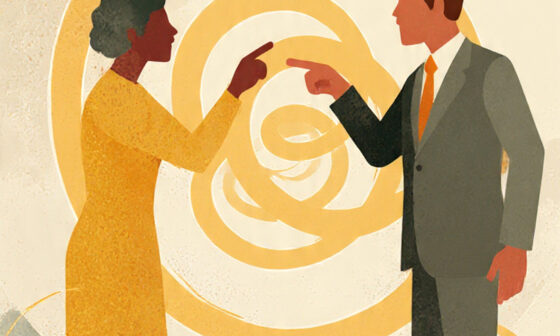So today I want to throw more light on and summarize the content of an episode from the Daily Stoic podcast by Ryan Holiday, a reminder that will help us ease our mind and tension: You don’t have to react to everything. In fact, choosing not to react might be the most powerful decision you make all day.
Marcus Aurelius once wrote, “You don’t have to turn this into something. You don’t have to have an opinion,” this was not apathy; it was strength. It was a refusal to be emotionally manipulated or pulled off course by someone else’s behavior. After all, the Stoics lived in a world filled with cruelty, slander, and provocation, yet they cultivated the incredible ability to remain still, calm, and unmoved.
While other people are reacting with outrage, the ancient Stoics, like Marcus, Epictetus, and Cato teach us a different way. A way rooted in restraint, self-awareness, and purpose.
The Power of No Reaction
We often think that strength means speaking up, clapping back, or standing our ground in every confrontation, but the Stoics teach a counterintuitive lesson: Sometimes, true strength is in NOT reacting at all.
Marcus Aurelius, a Roman emperor facing daily attacks, betrayals, and pressures, continually reminded himself not to let provocations dictate his behavior. Epictetus believed that being offended was a choice and that when we react with anger, we give away our power.
There is deep power in stillness, in refusing to be baited, refusing to be agitated, in not allowing every comment or circumstance to stir you up. When we react without thinking, we are not being brave; we are being controlled.
Stoic wisdom gives us the permission to pause and to ask: Does this really deserve my attention? Is this worth my peace? Do I really want to lose my self-control and power to this? Most of the time, the answer is no! And in that space between stimulus and response, we find the ability to remain grounded, calm, and unshaken.

Insults, Offense, Criticism, Agitation, and Inner Control
The Stoics were no strangers to criticism, insult, or offense but what set them apart was how little power they gave those offenses over their inner world.
Let us take Cato, for instance. When someone shouted an insult at him, he would pretend not to hear it. Not because he was weak, but because he knew his dignity did not depend on someone else’s opinion. He did not need to defend his ego; his restraint was his strength.
Marcus Aurelius, too, faced constant slander and bashing as an emperor, but instead of reacting with rage or revenge, he chose perspective. He reminded himself to consider the character of the person who criticized him: Why let someone who does not know you steal your peace?
And then there is Epictetus, the once-enslaved philosopher. When insulted, he would say that if the insulter truly knew him, they would have had even more to criticize, Lol, you humor there, letting knowing they have not done enough and not just that, but also that they can never do enough to get their words to make him agitated. He saw insults not as attacks but as reflections of others’ ignorance, pain, or immaturity. To be provoked by them would make him just as guilty.
These Stoics were not naive, slow, disengaged or indifferent; they simply refused to let external chaos dictate their internal clarity; they understood that while we can not always control what others say or do, we can always control how we respond.
Taming the Temper to Stay on Mission
Anger is seductive! It can promise control and justice but it rarely delivers anything useful, and the Stoics understood this deeply. They saw anger not as a strength, but as a liability, something that could derail your purpose, cloud your judgment, and leave lasting damage.
Seneca, in his famous writing on Anger, warned that anger is “a temporary madness.” And madness has no place in a disciplined, focused life. When you are consumed by emotion, you forget your mission! You make mistakes! You waste time and energy!
And that is why the Stoics worked hard to master their emotions not to suppress them, but to train them; they believed that calm minds make clear decisions. Anger might feel righteous in the moment, but it does not serve the long game. Marcus Aurelius knew he could not afford to lash out, very importantly, because as an emperor, his job was to lead, to guide, to protect. If he allowed himself to be provoked by every critic or adversary, he would lose sight of what truly mattered, and that is true for us, too.
Whether you are leading a team, raising a family, or simply trying to live with integrity, your mission is too important to let temper take the wheel. You are at your best when you are steady, when you are intentional, when you respond rather than react.
I know what I am about to say might sound odd at first, but have in mind that is not say that anything goes and that you should allow people belittle and oppression you, not at all, this is me saying DO NOT give others your power and ability to control your state of mind and heart with demeaning words. So I say, take the insult! Let the petty comment pass! Refuse the bait! Refuse to be agitated! Refuse to be provoked! Refuse to react! Tame your temper not because you are weak, but because your purpose is stronger and more important, because you say so, because you choose so.
The world today is spinning faster than ever, with the endless notifications, the constant opinions, trends and relentless pressure, there is one force that stands apart. This force is not loud; it does not dominate headlines, and it rarely gets credit for success, stability, or strength, but yet it is one of the most powerful and underrated forces in the world: Stillness.
The Stoic Emperor Marcus Aurelius understood this, because in his Meditations, he wrote repeatedly about stillness, not as a luxury, but as a necessity. He urged himself to be like a rock the waves keep crashing over: Unmoved! Unshaken! And calm in the middle of chaos! His beloved stepfather, Antoninus Pius, handed him power with a single word: Aequanimitas – equanimity.
Stillness is the kind of clarity that lets you think clearly when others panic; it is the inner strength that steadies you when the world feels like it is falling apart. It is what allows focus, creativity, courage, and compassion to rise to the surface, and without it, we drift, but with it, we thrive.
Continue Reading: The Most Powerful and Underrated Force in the World
Read Also: An Eye For An Eye Leaves The Whole World Blind
Read Also: Guard Your Heart Above All Else
Read Also: Justice: It Is About What You Do and Don’t Do
Conclusion
There will always be someone who will push you or at least try to push you, try to agitate you directly or passively, what am I saying? We will be constantly nudged to comment, to clap back, to take offense, to defend our pride, but as Marcus Aurelius reminded himself and us, you do not have to have an opinion: YOU CAN CHOOSE NOT TO HEAR IT! YOU CAN CHOOSE NOT TO SEE IT! You do not have to turn their opinions, actions, debates, or insults into a war: You do not have to be provoked! You can choose NOT to! This is not a weakness! This is mastery!
Drawing from the lives of Cato, Marcus, Epictetus, and Seneca, the Stoics show us that real power lies in self-command and self-control. They were not indifferent, but they were disciplined; they channeled their emotions, not suppressed them, because they knew their mission mattered more than their ego.
So the next time someone tests your patience, questions your motives, or tries to pull you into their storm, remember this: You do not have to join them! You can stay still! You can stay focused! You can keep your hands on your work and your heart anchored in peace!
Refusing to be provoked is not stepping back; it is stepping up. It is choosing clarity over chaos! Purpose over pride! And that is a choice worth making every time!





